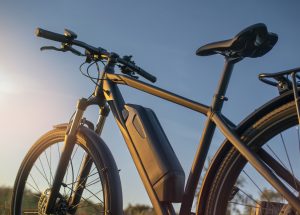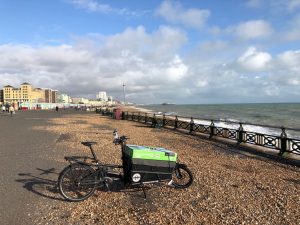4.1. Benefits of active travel
Discover the benefits of active travel for employers and employees. Read case studies from Sustrans on cycling and get more information on how to adopt an ebike or eCargo bike.
Active travel is beneficial to both you and your employees.
There are many benefits to active travel. As an organisation, you can promote a healthier and more active lifestyle. Your employees can also have a better work-life balance. Studies have found that active travel among staff has nearly halved the number of UK sick days. Visit the Sustrans website for more information.
There are also financial benefits for you as an employer. Some organisations have experienced the following:
- Reduced cost of parking. For example, GlaxoSmithKline found the cost per cyclist was 20% of the cost of providing a car parking space.
- Reduced grey fleet mileage claim costs – from 45p in a car to 20p on a bike per mile.
- Positive publicity boost.
- Improved business reputation.
- Reduced journey times due to making use of pedestrianised areas and avoiding traffic during peak times.
- Easier, faster and cheaper parking – often closer to the destination.
- No low emission zone charges.
- Opportunities to remove unnecessary vehicles from the fleet.
Check out the table below for more information on potential cost, emissions and time savings. This assumes a two-mile city centre journey. Cycling is the fastest and most efficient travel mode. It results in very low, if any, emissions or costs.
Table 15 – Potential cost, emissions and time saving
| Petrol or diesel car | electric bike | Pushbike | Walk | |
|---|---|---|---|---|
| Miles | 2 | 2 | 2 | 2 |
| Cost per mile | £0.14 (1) | £0.003 (2) | £0 | £0 |
| Emissions per mile (gCO2e) | 276 (3) | 3.8 (4) | 0 | 0 |
| Average speed (miles per hour) | 6.6 (5) | 13.75 (6) | 12 (7) | 3 (8) |
| Total costs | £0.27 | £0.01 | £0 | £0 |
| Total emissions (gCO2e) | 551.9 | 7.6 | 0 | 0 |
| Total journey time (minutes) | 18 | 9 | 10 | 40 |
- Based on 116.9266p per litre fuel taken from 2020 average of petrol and diesel fuel cost (AA 2021)
- Assuming 36V battery charging on average domestic 13amp three pin socket (GOV.UK 2021)
- Average car emissions in 2021 (BEIS 2021)
- Assuming home charging and conservative 25 mile range (Energy Saving Trust 2021)
- Average speed in Edinburgh city centre in 2017 (study by In-car Cleverness in (APH 2017)
- Assuming 50% 15.5mph (the fastest electric assisted speed allowed in the UK) and a 50% 12mph (average bike speed). Ebikes can go faster by pedalling.
- Average cycle speed (energy Saving Trust 2021a)
- Average walking speed (Energy Saving Trust 2021a)
Supporting active travel
To support staff who want to cycle to work, you should provide facilities including changing rooms, lockers and bike lock ups.
This has proven essential in increasing bike uptake in many organisations, including Mott Macdonald and GlaxoSmithKline.
This has proven essential in increasing bike uptake in many organisations, including Mott Macdonald and GlaxoSmithKline. For example, GlaxoSmithKline encouraged cycling by having a local bike store and maintenance services at its headquarters. GlaxoSmithKline also offers £1 per kilometre towards cycling accessories and clothing, to encourage a long-term transition to cycling.
You can also help staff switching to this form of active travel by providing pool bikes, ebikes or ecargo bikes.
Offering financial incentives can also help to encourage cycling. Employees can claim up to 20p per mile cycled on their bikes for business journeys. It’s important that you promote this incentive.
The UK Government currently offers Cyclescheme, which employers can offer as a benefit to their staff. This is free to join and can save employees 25-39% off a new tax-free bike through a salary sacrifice scheme.
Other incentives may encourage your team to increase active travel. This can include prizes for gym or sports class memberships, as well as hosting activities or cycling and walking events. For example, under the Sustrans Workplace Travel Challenge, 160 workplaces joined together and saved 60,000kg of CO2 by replacing almost 72,000 journeys with active travel methods.
Adopt ebikes
Ebikes can improve your workforce’s health and cut carbon emissions by replacing vehicle journeys.
An ebike is an electric-assisted pedal bicycle. It has an electric motor which provides power assistance when the cyclist is pedalling. This reduces the amount of effort required for the cyclist. The motor is powered by a battery, which you can charge from a regular three-pin socket.
Because ebikes make it easier to cycle, employees may be more willing to use them and to travel further. This can increase the length of car journeys that can be replaced by active travel.
The electricity costs for ebikes are also much lower. Cycling 100 miles on an ebike can costs as little as 30p in electricity if charging at home*.
We recommend you trial pool ebikes. You can also consider running cycling training to support their uptake by staff. Several organisations found this approach helped to boost cycling confidence and show the travel opportunities ebikes provide.
Cycling Scotland currently offers a suite of cycle training programmes to support workplaces with pool bike adoption. lso also offers funding towards installing cycling infrastructure in the workplace.
*Assuming a 36V battery, £0.17 cost per kWh at home, and a conservative 25-mile range.
Ebikes are less physically demanding than regular bikes. This is particularly noticeable when going over hilly terrain. They are a great option for those who may find riding a traditional pushbike too physically challenging.
They might also be more appealing to use during the work day as users can avoid arriving at their destination exhausted and covered in sweat.

Adopt eCargo bikes
eCargo bikes can replace your light commercial vehicle mileage.
eCargo bikes are bikes designed to carry a load. They come in many shapes and sizes and can be adapted to suit specific requirements. They have a weight capacity of up to 350kg and a load volume capacity of up to 1m3. As such, ecargo bikes are ideal for logistics and short distance deliveries in and around urban areas and between operational sites.
eCargo bikes offer similar cost and CO2e savings to standard ebikes. However, the increased weight of the bike means they have slightly higher running costs. Travelling 100 miles on an ecargo bike will cost around 28p in electricity. This is still far cheaper than taking a car or van.
If you are introducing ecargo bikes into your fleet, we recommend implementing a training programme. Familiarisation training will reduce the risk of injuries. It will also increase staff confidence and willingness to use these bikes. High staff uptake will maximise the financial and environmental benefits of the bikes.

Case study
-
Mid Sussex Electrical operates across southeast England and London. Its customers include property developers, a utility company, an outdoor market, a public transport service provider and a seafood supplier.
The company estimates it saves around £100 per trip by taking an eCargo bike over a van. This is mainly by removing the requirement to pay congestion charges.
Using an eCargo bike has helped the company take on jobs that aren’t easily accessible by a van, such as work within a shopping centre in Brighton. Employees can wheel the bike directly into the client’s store, meaning they can avoid having to park and carry heavy tools over a distance on foot.
Mid Sussex Electrical Ltd estimates it has eliminated 2,500 van miles per year in total, equating to 0.99t CO2e. (Energy Saving Trust, 2021c).
